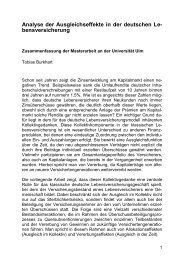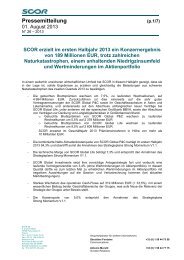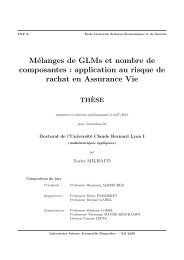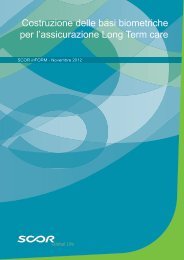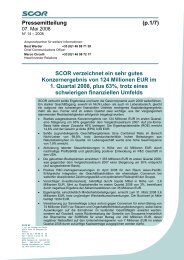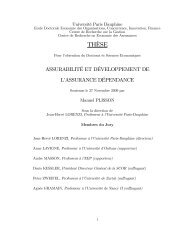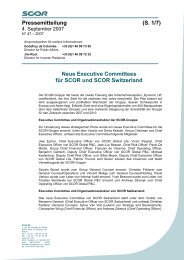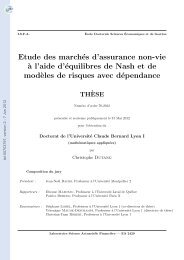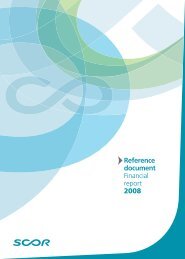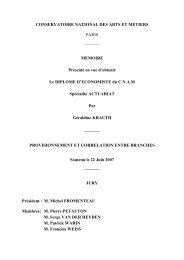4.4 Legal risk - Scor
4.4 Legal risk - Scor
4.4 Legal risk - Scor
You also want an ePaper? Increase the reach of your titles
YUMPU automatically turns print PDFs into web optimized ePapers that Google loves.
14 ADMINISTRATIVE AND MANAGEMENT BODIES<br />
14.1 Information on the members of the Board of<br />
Directors and Senior Management<br />
14.1.1 INFORMATION CONCERNING THE MEMBERS OF THE BOARD OF DIRECTORS<br />
In accordance with European law governing Societas Europaea and applicable French law, the principal responsibility of the<br />
Board of Directors is to determine the guiding principles of the Company’s business plan and strategy and to monitor their<br />
application. The Chairman and Chief Executive Officer (Président-Directeur Général) has full executive authority to manage<br />
the business of the Company, subject to the prior authorization of the Board of Directors or the Company’s shareholders for<br />
certain decisions as required by law pursuant to the Company’s bylaws (statuts).<br />
Board of Directors<br />
Under European and French law, the Company’s Board of Directors prepares and presents the year-end accounts of the<br />
Company to the shareholders and convenes the shareholders’ meetings of the Company (the “Shareholders’ Meeting”). In<br />
addition, the Board of Directors reviews and monitors SCOR’s economic, financial and technical strategies. SCOR’s bylaws<br />
(statuts) provide that the Board of Directors is composed of no fewer than nine and no more than eighteen members. The<br />
actual number of Directors may be modified by the shareholders at the Shareholders’ Meetings. The Board of Directors<br />
cannot by itself increase the number of its members.<br />
The Board of Directors consists of 13 members, including 12 voting members (including one elected employee<br />
representative, known as the “Employee Director”) and one non-voting member, known as the “censeur” (the “Non-Voting<br />
Member”). The Employee Director is elected by the employees of the Company and of its subsidiaries in a two round<br />
election on a simple majority basis. The elected candidate is then proposed by the Board of Directors to be appointed by the<br />
Shareholders’ Meeting. Once appointed by the Shareholders’ Meeting, the Employee Director has the same rights and<br />
obligations as the other members of the Board of Directors (including the right to vote on any decision of the Board of<br />
Directors). Pursuant to French law and the Company's bylaws, the Shareholders' Meeting may appoint up to four Non-<br />
Voting Members (only one Non-Voting Member has been appointed to date). The Non-Voting Member is entitled to attend<br />
meetings of the Board of Directors, is eligible to receive the Director's fee as approved at the Shareholders’ Meeting, but not<br />
to vote on any decision of the Board of Directors. He has a consultative role.<br />
Under SCOR’s bylaws (statuts), each director must own at least one Ordinary Share for the duration of his or her entire term<br />
of office. Under French law, a director may be an individual or a legal entity for which an individual is appointed as<br />
permanent representative, except for the Chairman, who must be an individual. Pursuant to article L. 225-20 of the French<br />
Commercial Code, the permanent representative of a legal entity is subject to the same conditions, obligations and civil and<br />
criminal liabilities as if he or she were director in his or her own name, without prejudice to the joint and several liability of the<br />
legal entity he or she represents. 12 of the 13 members of the Board of Directors are individuals and one director, Malakoff<br />
Médéric Group, is a corporation (represented by Guillaume Sarkozy as permanent representative).<br />
The Directors are elected for either a two-year, four-year or six-year term. The Employee Director is currently elected for a<br />
two-year term as well as the non-voting member. Under SCOR’s bylaws (statuts), Directors may hold office until the age of<br />
77. A Director reaching the age of 77 while in office has to retire at the expiration of the term of his or her office, as<br />
determined at the Shareholders’ Meeting. Non-employee Directors and the Non-Voting Member are elected by the<br />
shareholders and serve until the expiration of their respective term, or until their resignation, death or removal, with or<br />
without cause, by the shareholders. Vacancies on the Board of Directors may, under certain conditions, be filled by the<br />
Board of Directors, pending the next Shareholders’ Meeting.<br />
Directors are required to comply with applicable law and SCOR’s bylaws (statuts). Under French law, Directors are liable for<br />
violations of French legal or regulatory requirements applicable to Societas Europaea, violation of a company’s bylaws<br />
(statuts) or mismanagement (faute de gestion). Directors may be held liable for such actions both individually and jointly with<br />
the other Directors.<br />
For further information, please refer to the report of the chairman of the Board of Directors in Appendix B of the Registration<br />
Document.<br />
The table below lists Directors (including the Employee Director) and Non-Voting Member, their date of birth, positions with<br />
SCOR and principal business activities, the dates of their initial appointment as Directors and the expiration dates of their<br />
term of office.<br />
118



